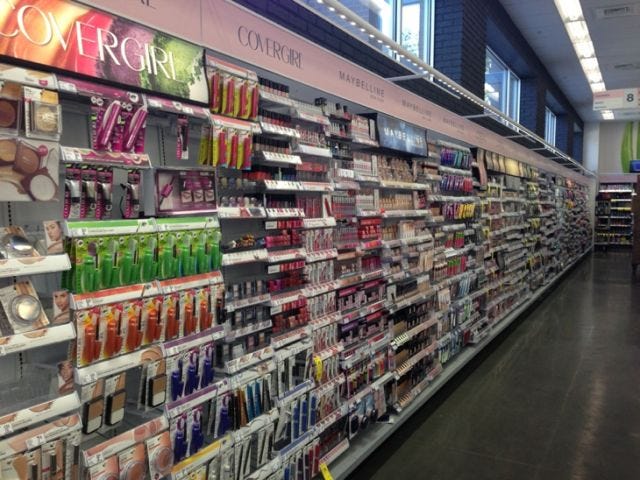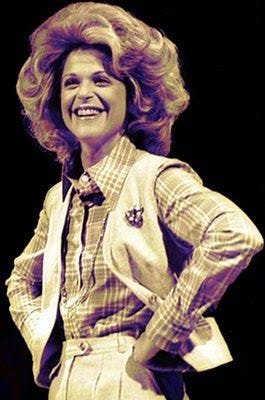So What, Who Cares (vol 2, issue 23) How the lipstick index has gone upscale
Hello! I very much enjoyed hearing your suggestions for love songs that should be put into a rocket and shot into the sun: "Wicked Game" by Chris Isaak; "Every Breath You Take" by the Police; "Danny's Song" by Loggins and Messina; "Annie's Song" by John Denver; and "im not particularly into policing song preferences. i guess 1 <3 song i'd retire is anything that reinforces patriarchal norms."
Also, there are those of you who really do like "Fields of Gold." And that's okay too. Shout-out to @MNInsomniac for reminding me of the Eva Cassidy version, which is genuinely lovely. Thank you to everyone who shared their preferences with me -- I appreciate your time and effort!
Today's question, which is related to the pop culture note of the day: If you were an SNL watcher, who were your most and least-favorite cast members -- and why? I'd love to hear from you via Twitter or email.
*

Way back in the day (2001), former Estee Lauder CEO Leonard Lauder postulated that when economic times are tough, women will run out and buy lipstick because it's a cheaper thrill than, say, a buying a purse. His theory became known as the "lipstick index," and the general principle, according to Lauder, is: "We have long observed the concept of small luxuries, things that can get you through hard times and good ones. And they become more important during harder times."
What, then, to make of a market where the less well-off aren't even buying lipstick at a brisk pace?
Fewer U.S. women are buying makeup, but the ones who do spend more money on it. This is the conclusion that market research firm NPD Group came to when it crunched the numbers for 2014 and found that total spending on the "prestige beauty market" -- defined as products sold mainly in department stores -- rose 6% to $11.2 billion dollars. However, the overall volume of prestige beauty shoppers has dropped by an unreported percentage.
Also of note: the spending for the "mass beauty market" -- your drugstore buys -- was "flat" according to Nielsen. That research company has not publicly released numbers for the scope of the mass beauty market. However,
So what? There are actually two stories here. First, mass beauty spending has been flat for two years running, or so says rival research firm Datamonitor, which cites the uneven post-recession recovery as the primary reason why prestige beauty sales are improving and mass beauty stagnating. For more evidence of this, look to L'Oreal's quarterly earnings report, issued on February 12: the company says its luxury brands are driving its sales growth and weak mass-market sales in the U.S. have been hurting the bottom line.
Second, pay attention to the spin the NPD Group is giving the numbers: People are looking elsewhere for their kicks, and the way to win them back is by offering an experience at every point of sale. This is another bit of anecdotal evidence that more marketers are going to lean heavily on the tactic of persuading consumers that what they're really buying is an experience -- the product is just a nice souvenir.

Who cares? Companies that have to cater to the mass market. Not everyone can do it well -- the leadership team at Estee Lauder frankly admits they can't, and this is a cosmetics firm that made $11 billion in global beauty sales last year. And not everyone is L'Oreal, which is using its premium brands to offset a lack of growth in the mass market. If the average consumer still feels squeezed, expect to see more drugstore brands like Bonne Bell closing, selling off brands or consolidating.
This might also be a moment of truth for the subscription box market (vol 2, issue 5; vol 1, issue 34) , which is going to want some of that sweet, sweet prestige-cosmetics cash and is perfectly poised to sell its services as premium experiences.
Finally, prestige cosmetics shoppers, keep an eye on prices: Since sales went up last year even though fewer people bought stuff and prices rose by 2-4%, that's a whole lot of incentive to keep price points steady or nudge them up a little. The question will be whether those prices come with a sales pitch about the experience of treating yourself.
Since lipstick did lead in prestige cosmetic sales last year, perhaps it's time to revisit what it says about the economy when women buy lipstick.
*

Today's pop culture note: Saturday Night Live is turning 40 this year, in case you hadn't heard. Rolling Stone ran a ranking of all 141 people and/or puppets who have been cast members. I don't agree with a lot of the standings, but that's why I do things like SNL drafts -- so I can assert my own ranking system.
The Rolling Stone compilation did have a bonus benefit: In his Hollywood Reporter interview, Lorne Michaels answered the question on who was coming to the 40th anniversary show with, "The rules we used were these: Every host was invited. Every musical guest was invited. Any castmember and writer who had been here longer than a year was invited."
So you know I went through that list and compiled the names of all the former SNL players who didn't get invited to the 40th anniversary show, if the Lorne Michaels criteria were indeed the ones applied.
The following people were left off the list:
Robert Downey Jr., The Muppets, Gilbert Gottfried, Randy Quaid, Laurie Metcalf, Emily Prager, Matthew Laurance, Patrick Weathers, Yvonne Hudson, Charles Rocket, Dan Vitale, Ben Stiller, Christine Ebersole, Ann Risley, Jerry Minor, Rob Riggle, Damon Wayans, Anthony Michael Hall, Siobhan Fallon, Nancy Walls, David Koechner, Laura Kightlinger, Morwenna Banks, Chris Elliott, Janeane Garofalo, Sarah Silverman, Danitra Vance, George Coe, Joan Cusack, Noël Wells, Tim Robinson, Mike O'Brien, John Milhiser, Michael McKean, Jenny Slate, Gail Matthius, Brooks Wheelan, Casey Wilson, Rich Hall, Michaela Watkins, Terry Sweeney, Beth Cahill, Denny Dillon, Pamela Stephenson, Martin Short, Billy Crystal, and Christopher Guest.

Honestly, any group that includes Iron Man, one of the Steppenwolf Theater's standouts, one-third of Spinal Tap, Derek Zoolander, and the voice of Mummy Pig on Peppa Pig sounds just as interesting than the official guest list for the official celebration.
ANYWAY. For more reading on SNL, the "Saturday Night's Children" series at Splitsider has kind, informative appraisals of many players.
For book-length reportage, I recommend James Miller & Tom Shales' Live From New York: The Complete, Uncensored History of Saturday Night Live as Told by Its Stars, Writers, and Guests, which is an oral history or Doug Hill and Jeff Weingrad's Saturday Night: A Backstage History of Saturday Night Live, which is a more traditional work of reportage.
And if you'd like to reflect on what a difference two decades can make, please enjoy the juicy New York magazine piece on SNL at 20, "Comedy Isn't Funny."
*
Did you miss an issue of So What, Who Cares? The archive is here. Are there typos? I apologize in advance.
As always, I welcome your feedback and suggestions -- you can reach me through Twitter or email. Please do not hesitate to let me know what you think about So What, Who Cares, or suggest links/topics/pop culture that rings your bell.
If you really like it, tell a friend to subscribe.

